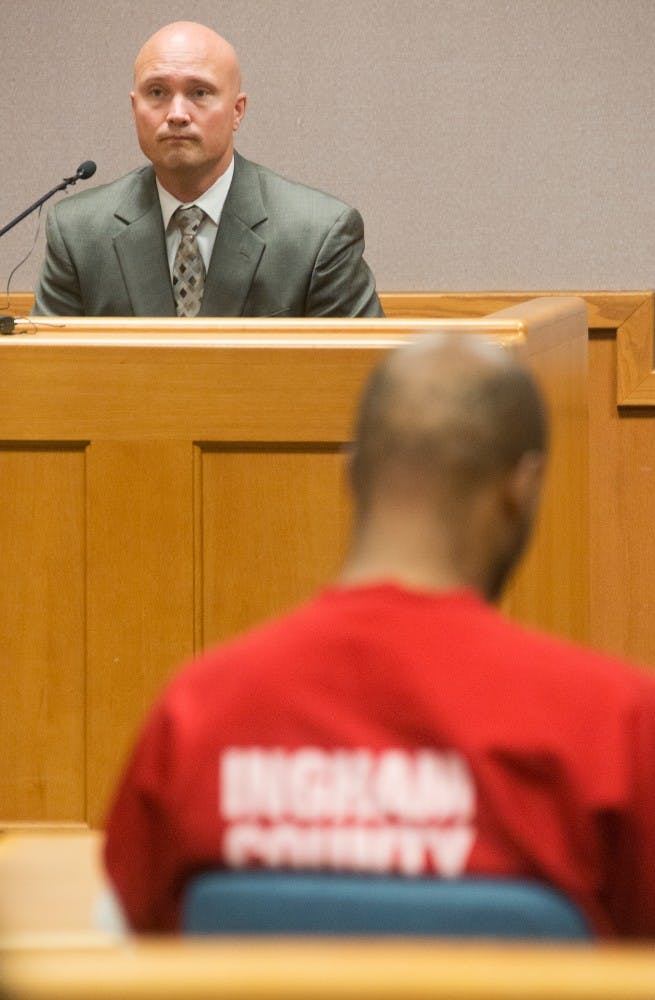Ricard Taylor, the man standing trial for the murders of a Frandor Rite Aid pharmacist and an East Lansing resident, had a history of paranoid schizophrenic breakdowns with homicidal intentions which resulted in his being hospitalized several times, a forensic psychiatrist revealed in court Monday.
Most of the breakdowns — allegedly including the one that lead to the murders — were the culminations of Taylor's conspiratorial delusions centered around acquaintances and loved ones attempting to poison him, humans morphing into malevolent supernatural entities.
In addition, breakdowns centered on members of the Nation of Islam monitoring and plotting to harm him because of alleged intelligence operations conducted on the group by Taylor's family, Ellen Garver, a Center for Forensic Psychiatry consulting forensic examiner, said in court.
Neither the defense nor the prosecutor denied Taylor had suffered and was suffering at the time of the killings from mental illness. But what the parties do dispute is whether Taylor's mental illness at the time constitutes legal insanity.
Under the Michigan Code of Criminal Procedure, a person is deemed legally insane if they "lack substantial capacity either to appreciate the nature and quality or the wrongfulness of his or her conduct or to conform his or her conduct to the requirements of the law."
At the time of the fatal shootings, Taylor had stopped taking antipsychotic medication for several months. Garver, who was appointed to examine Taylor for competency to stand trial and legal insanity, likened his mental state off the medication to a pot of rice with the heat under it turned from simmering to boiling.
"It is a matter of time before these (delusions) become very prominent in his thoughts and he starts acting on them," Garver said.
Garver argued Taylor's "paranoid delusions made him substantially unable to conform his behavior to the law's requirements" at the time of the slayings because his motives for murdering Rite Aid pharmacist Michael Addo and neighbor Jordan Rogers were delusion-driven.
During one of three interviews with Garver, Taylor divulged his delusion that Addo and Rogers were stealing prescription pills and selling them to provide funding for the Nation of Islam — the same Nation of Islam that Taylor alleged President Barack Obama ordered to increase their monitoring of him when Obama gave a speech and signed the Farm Bill at MSU, she said.
The necessity of murdering Addo and Rogers, Taylor said in the third interview, originated in their morphing into werewolves before him and thereby presenting not only a threat to him but the possibility of their immortality.
Because Taylor divulged a real-world motive for the killings — that of anger and frustration — in the post-arrest interview with detectives and the first interview with Garver, Jeffery Wendt, a private practitioner of forensics psychiatry who re-examined Taylor for the prosecution, contended that Taylor used his past hospitalizations — which stemmed from episodes of overwhelming, paranoid belief that humans were morphing into malevolent supernatural beings — as fodder for fabricating a legal insanity defense.
Wendt cited his interview with Taylor, Taylor's consumption of werewolf-related media around the time of the Garver interviews and Taylor's late disclosure of the werewolf motive as reasons for being skeptical of Taylor's legal insanity at the time of the killings.
Rather, Wendt said, the post-arrest interview with detectives and the first interview with Garver — in which Taylor gave a similar narrative to the one he told the detectives — provide a better insight into the state of his mental illness at the time.
In the post-arrest interview, which was taped and shown in court Friday, Taylor eagerly and cheerfully told the detectives the details of the murders and the events which led to them in a rambling and at times incoherent narrative.
The motivations for killing Rogers then was two-fold — that Rogers was endangering his soon-to-be stepdaughters by allegedly keeping the house unsanitary and unsafe and that Rogers yelled slurs at Taylor and fought him the night before.
The motivations for killing Addo earlier that day remain unclear. The best answer Taylor gives from the post-arrest interview is frustration at Addo allegedly asking for his ID and telling him "what (he) wanted to hear" during the course of Taylor purchasing eyedrops at the Frandor Rite Aid.
The late disclosure align with thought disorganization that is symptomatic of schizophrenics, Garver said.
Paranoid schizophrenics construct large interweaving narratives that are relayed, or not, to listeners in such disorganized ways that if a seemingly small insight into the web isn't followed up on with question, then the web remains largely unseen, she said.
"If I followed every one of (his delusional ideas), I still might be interviewing him," Garver said.
The trial is scheduled to resume Tuesday, with the defense and prosecution giving their closing arguments.
Support student media!
Please consider donating to The State News and help fund the future of journalism.
Discussion
Share and discuss “Man charged in May 2014 Rite Aid shooting was delusional, psychiatrist contends in court” on social media.







